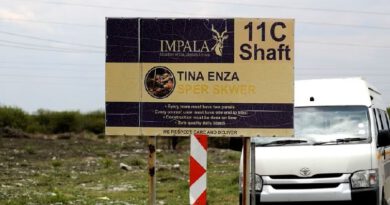Scandal dogs self-styled party of the poor, the EFF
The top leaders of South Africa’s Economic Freedom Fighters, famous for abrasive politics and brawling in parliament, have become embroiled in a string of scandals that has dented the party’s efforts to portray itself as a voice of the poor ahead of elections in May.
Deputy party leader Floyd Shivambu allegedly secured funds looted from the failed VBS Mutual Bank, a probe commissioned by the central bank and reports by the AmaBhungane Centre for Investigative Journalism show. Party president Julius Malema and Shivambu also unduly benefited from municipal vehicle fleet contracts worth R1 billion, according to another AmaBhungane report. The EFF says there’s no proof its officials did anything wrong.
Yet its public relations woes are good news for the ruling African National Congress, which hemorrhaged support during former President Jacob Zuma’s scandal-marred tenure and is trying to rebuild its image under new leader Cyril Ramaphosa. The Democratic Alliance, the main opposition party, faces its own difficulties, including infighting in its Cape Town stronghold and challenges in governing cities it won from the ANC in a 2016 municipal vote.
“What has definitely set the EFF back is the VBS bank scandal,” said Dirk Kotze, a political science professor at the University of South Africa. “The party has up to now, and relatively successfully, presented itself as the anti-corruption voice in South Africa.”
Fifty-six percent of 1 017 registered voters surveyed by the South African Institute of Race Relations between November 26 and December 4 said they supported the ANC, up from 52% in September. Backing for the EFF dipped to 11% from 13%, and for the DA to 18% from 23%. Based on a 69% turnout, the institute projected that the ANC would end up with 59% of votes cast, the DA 22% and the EFF 10%.
Malema, a 37-year-old former leader of the ANC’s youth wing, founded the EFF five years ago after he was expelled from the ruling party for criticising Zuma and his policies. The EFF’s calls to nationalise land, banks and mines have found resonance among many poor, black township residents, whose standard of living has improved little since the end of apartheid. It won 6% of the vote in the last national election in 2014 to become the third-largest party.
Charismatic leadership
The EFF’s charismatic leadership and its penchant for political theatre have bolstered its support. Its lawmakers wear red miners’ coveralls and maids’ uniforms to parliament and fought with security guards trying to stop them from disrupting Zuma’s speeches. Its share of the vote rose to 8% in a 2016 municipal election, while support for the ANC slumped to a record low of 54%.
Despite its proclaimed pro-poor stance, some of the EFF’s leaders have taken up residence in exclusive Johannesburg suburbs, drive Range Rovers and wear Breitling watches and other expensive fashion accessories. That’s led critics to dub them “Gucci revolutionaries” and “champagne socialists.” Some ANC officials have been criticised for similar lifestyles.
More Resolute
Malema is adamant that the EFF draws support because of its pro-poor stance and determination to give the black majority a bigger stake in the economy. He argues that supporters aren’t alienated by the conduct of some of its leaders or reports that implicate them in wrongdoing — allegations Malema says are unfounded.
“The brand EFF will never be shaken by such things,” he told reporters in Cape Town on December 4. “If anything, we are more resolute.”
Malema may have a point, according to Ralph Mathekga, an independent political analyst. He sees the EFF cementing its position as South Africa’s third-biggest party despite its recent public relations challenges.
“The EFF supporters are not willing to listen to any opposition about their party,” he said. “They are extremists, if they believe in you, then they believe in you.”
L.P
Source: moneyweb.co.za



